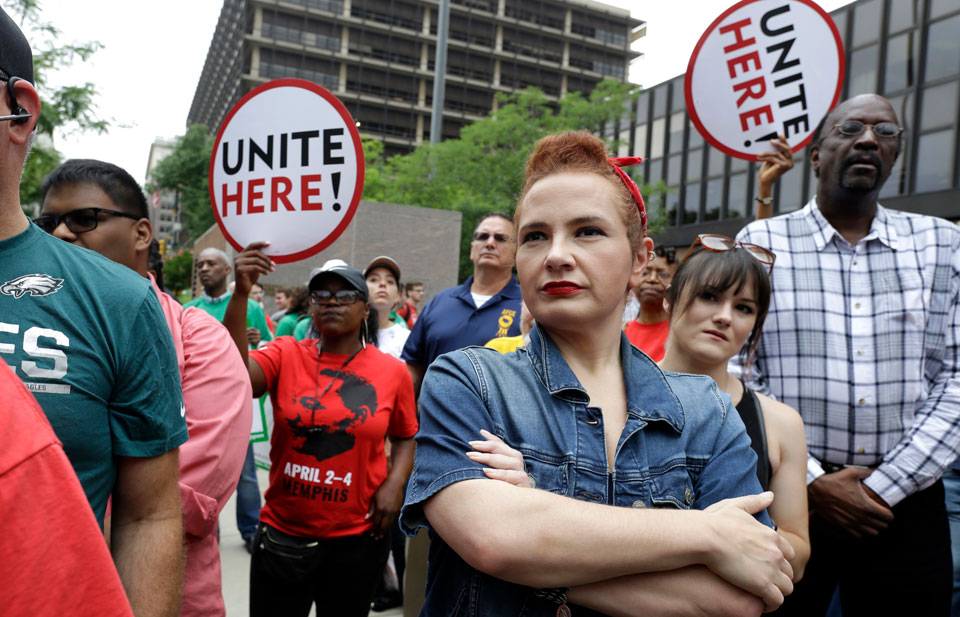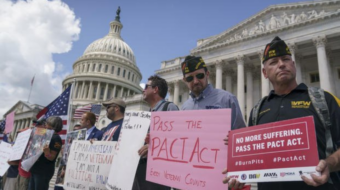
WASHINGTON (PAI)—Thanks to a recent U.S. Supreme Court pro-business ruling, some 80% of private-sector U.S. workers will be forced into arbitration with their bosses by 2024, a new report predicts.
The report, by the Economic Policy Institute and the Center for Popular Democracy, paints a stark picture of what would happen to workers at the mercy of arbitrators. Statistics show that supposedly neutral quasi-judges side with bosses more than 90% of the time.
And the arbitration clauses, now given supremacy by the Supreme Court’s Epic Systems v. Lewis decision, would let employers strip workers of their right to join together in court to fight wage theft, discrimination or harassment, the report says.
Arbitration, the court’s GOP-named majority ruled, also overrides grievance procedures.
The report, “Unchecked Corporate Power: Forced Arbitration, The Enforcement Crisis, And How Workers Are Fighting Back,” projects the Epic Systems case is spurring corporations to dramatically increase their use of forced arbitration clauses. Soon, only a small minority of American workers will be able to sue their employers.
This trend makes it critical that public enforcement agencies, like state departments of Labor, have the resources they need to ensure that employers respect important worker protections like minimum wage, earned sick and family leave, fair workweek standards, and protections against discrimination and harassment, the report says.
Yet public agencies are crippled by shrinking budgets and struggle to address persistent workplace violations, it adds.
Report authors Kate Hamaji and Rachel Deutsch of the center and Celine McNicholas, Heidi Shierholz, and Margaret Poydock of EPI start with analysis of historical and current state-level funding by the National Employment Law Project. It finds the number of covered workers per federal wage-and-hour investigator and health and safety officer has more than doubled since 1994, to over 170,000 workers for each agency staffer. In six states profiled in the report, the number of workers per investigator range from 54,900 to 188,800.
The report calls on Congress to override Epic Systems and restore the fundamental rights of working people to enforce their rights by passing the Restoring Justice for Workers Act and the Forced Arbitration Repeal Act.
Those two measures, pushed by House Judiciary Committee Chairman Jerry Nadler, D-N.Y., and House Education and Labor Committee Chairman Bobby Scott, D-Va., are pending before Nadler’s panel.
“Congress must act to overturn the Supreme Court’s deeply flawed Epic Systems decision, which makes it nearly impossible for millions of workers to get justice when their employers violate fundamental workplace protections,” said McNicholas, EPI’s Director of Government Affairs.
“These laws were passed to ensure that workers in this country have the basic rights to fair pay and a safe workplace free from discrimination—Congress cannot allow a Supreme Court dominated by corporate interests to take them away. We must demand representatives restore our rights and pass the Restoring Justice for Workers Act and the Forced Arbitration Injustice Repeal Act.”
“For far too long, corporations have tied the hands of American workers through the use of forced arbitration clauses, which are often buried in the fine print of employment contracts and used as a precondition for employment,” Nadler added. “Forced arbitration strips working Americans of their day in court to hold employers accountable for wage theft, discrimination, harassment and many other forms of misconduct.”
The two bills, Nadler added, would “finally put an end to this exploitation of American workers and to ensure they have equal protection under the law to hold their employers accountable for illegal behavior. Victims of sexual assault, racial discrimination, and other forms of corporate abuse and misconduct deserve their day in court.”
The report identifies the “whistleblower enforcement” model as the most promising state-level solution to the corporate accountability crisis. Bills introduced in six states in 2019—Massachusetts, Maine, New York, Oregon, Vermont, and Washington—would empower workers to sue law-breaking employers on behalf of the state and all injured workers, including those covered by arbitration clauses.
The bills allow a worker to file a representative action on behalf of all the company’s workers, just as the agency is authorized to do, allowing collective enforcement of rights in spite of Epic Systems. Penalties owed by lawbreaking employers fully fund enforcement agencies, the state measures say.
“Through the courage of workers demanding change, and the leadership of their elected representatives, we can restore access to courts, empower workers to hold lawbreaking employers accountable, and make hard-won workplace standards meaningful to families across the country,” said Rachel Deutsch, supervising attorney for worker justice at the Center for Popular Democracy.
The report cites California’s Private Attorney General Act as a successful model. In the most recent fiscal year, California’s Labor Department received over $34 million in PAGA revenue. Since PAGA started, recovered money funded a wide range of enforcement programs, including cracking down on companies that fraudulently misclassify their employees as independent contractors to avoid minimum wage, unemployment insurance, and other basic obligations to workers.
Brenda Rojas, a first-generation college student in Oregon, is among those calling on policymakers to enact bold reforms.
“While working at Buffalo Wild Wings, my coworkers and I experienced wage theft regularly, and worked in an environment of constant sexual harassment,” Rojas told the report authors.
“Complaining about these working conditions was pointless because we had signed a forced arbitration clause and the company knew that we couldn’t fight back in court. None of us understood the forced arbitration language when we signed our new hire paperwork, but we were told that if we did not ‘check all the boxes,’ we would not be hired. How can students like me build a brighter economic future when our employers are allowed to rip us off?”
To read the full report, visit www.epi.org/publication/unchecked-corporate-power.











